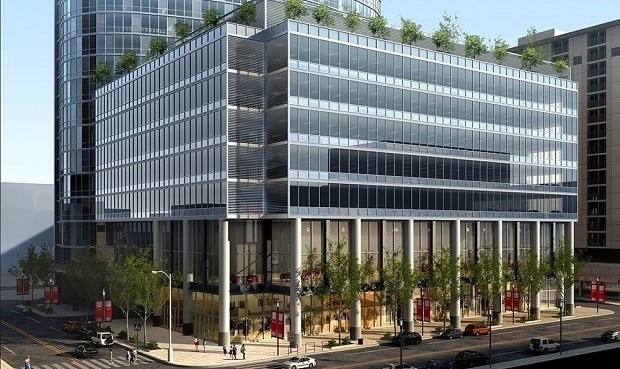
CHICAGO—The CBD and its surrounding neighborhoods will see thousands of new apartment units come online over the next two years, and some fear that developers have started too many projects for the market to absorb efficiently. But Steve Fifield of Fifield Cos. tells GlobeSt.com that has no worries about eventually filling up the company's giant new apartment project at 727 W. Madison St. in the West Loop. The developers recently secured financing for the 46-story, 492-unit project, and their conservative plan gives them the luxury of time.
“We're not expecting to lease this building up in six months,” Fifield says. Instead, after the builders complete the tower in late 2018 and open that winter, tenants should occupy an average of about 30 units per month. That would mean a 17-month lease up, a pace far below what Fifield saw at its 848-unit Alta at K Station development. Finished in 2010, those West Loop towers attracted roughly 45 tenants per month.
Fifield points out that even when the real estate market hit bottom in 2008, Echelon at K Station, the company's development at 353 N. Des Plaines, was bringing in an average of 21 tenants per month.
And he won't be concerned even if it takes an extra six months to complete the lease up for 727 W. Madison. “We gave ourselves plenty of room.”
HFF worked on behalf of Fifield Cos. and its partner F & F Realty to arrange a joint venture partnership with affiliates of Ares Management, LP. HFF also secured $117.768 million in construction financing for the project from Bank of the Ozarks.
Conservative plans have been baked into many of the new luxury apartment developments now taking shape around the Loop, Fifield says. Therefore, even if leasing does not quite match the recent pace, “you won't be reading about a lot of foreclosures in a few years.”
Another reason Fifield approaches the apartment market with such confidence is his expectation that escalating costs will thin out the developers willing to risk breaking ground. “Construction costs have been growing 10% every year,” he says, largely due to the shortage of qualified labor that began when the market collapsed in 2008. Along with other factors, that has pushed development costs for luxury apartments to between $350,000 and $380,000 per unit, up from just $260,000 per unit in 2013.
As a result, “only sites in the most desirable locations, locations that really have something going for them,” will get underway. The new TODs along Milwaukee Ave., for example, or the luxury towers in the West Loop area, offer residents a whole lifestyle, and can command premium rents. Without that, “you won't have a feasible project.”

CHICAGO—The CBD and its surrounding neighborhoods will see thousands of new apartment units come online over the next two years, and some fear that developers have started too many projects for the market to absorb efficiently. But Steve Fifield of Fifield Cos. tells GlobeSt.com that has no worries about eventually filling up the company's giant new apartment project at 727 W. Madison St. in the West Loop. The developers recently secured financing for the 46-story, 492-unit project, and their conservative plan gives them the luxury of time.
“We're not expecting to lease this building up in six months,” Fifield says. Instead, after the builders complete the tower in late 2018 and open that winter, tenants should occupy an average of about 30 units per month. That would mean a 17-month lease up, a pace far below what Fifield saw at its 848-unit Alta at K Station development. Finished in 2010, those West Loop towers attracted roughly 45 tenants per month.
Fifield points out that even when the real estate market hit bottom in 2008, Echelon at K Station, the company's development at 353 N. Des Plaines, was bringing in an average of 21 tenants per month.
And he won't be concerned even if it takes an extra six months to complete the lease up for 727 W. Madison. “We gave ourselves plenty of room.”
HFF worked on behalf of Fifield Cos. and its partner F & F Realty to arrange a joint venture partnership with affiliates of Ares Management, LP. HFF also secured $117.768 million in construction financing for the project from Bank of the Ozarks.
Conservative plans have been baked into many of the new luxury apartment developments now taking shape around the Loop, Fifield says. Therefore, even if leasing does not quite match the recent pace, “you won't be reading about a lot of foreclosures in a few years.”
Another reason Fifield approaches the apartment market with such confidence is his expectation that escalating costs will thin out the developers willing to risk breaking ground. “Construction costs have been growing 10% every year,” he says, largely due to the shortage of qualified labor that began when the market collapsed in 2008. Along with other factors, that has pushed development costs for luxury apartments to between $350,000 and $380,000 per unit, up from just $260,000 per unit in 2013.
As a result, “only sites in the most desirable locations, locations that really have something going for them,” will get underway. The new TODs along Milwaukee Ave., for example, or the luxury towers in the West Loop area, offer residents a whole lifestyle, and can command premium rents. Without that, “you won't have a feasible project.”
Want to continue reading?
Become a Free ALM Digital Reader.
Once you are an ALM Digital Member, you’ll receive:
- Breaking commercial real estate news and analysis, on-site and via our newsletters and custom alerts
- Educational webcasts, white papers, and ebooks from industry thought leaders
- Critical coverage of the property casualty insurance and financial advisory markets on our other ALM sites, PropertyCasualty360 and ThinkAdvisor
Already have an account? Sign In Now
*May exclude premium content© 2025 ALM Global, LLC, All Rights Reserved. Request academic re-use from www.copyright.com. All other uses, submit a request to [email protected]. For more information visit Asset & Logo Licensing.








